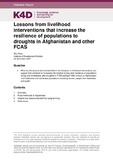| dc.contributor.author | Price, Roz | |
| dc.date.accessioned | 2022-02-02T13:52:17Z | |
| dc.date.available | 2022-02-02T13:52:17Z | |
| dc.date.issued | 2021-11-23 | |
| dc.identifier.citation | Price, R.A. (2021). Lessons from livelihood interventions that increase the resilience of populations to droughts in Afghanistan and other FCAS. K4D Helpdesk Report 1067. Institute of Development Studies, DOI: 10.19088/K4D.2022.012 | en |
| dc.identifier.uri | https://opendocs.ids.ac.uk/opendocs/handle/20.500.12413/17111 | |
| dc.description.abstract | Creating and protecting more resilient rural livelihoods is seen as being key to advancing Afghanistan’s development and improving its reslience to climate change impacts, particularly drought. This rapid review draws on policy and programme information from donor and multi-lateral organisations and some academic literature to identify best practices and lessons learned on interventions to support livelihood resilience (to drought) in Afghanistan. Where possible, final project evaluations were utilised. Some broader recommendations and insights are taken from other fragile and conflict-affected situations (FCAS) and also from resilience and livelihoods interventions in Afghanistan that are not necessarily explicitly linked to dought.
This review highlights the prominence of ‘resilience’ in donor interventions, but that there is a continued lack of clarity on how it should be measured or evaluated.
This rapid review uses broad search categories and approaches, including database and website searches and snowballing of references. Inclusion and exclusion criteria were developed iteratively, with abstracts and documents assessed to find the most relevant papers. Donor databases were searched for relevant information.
Much of the literature identified through this rapid review is donor-based evaluations of projects in Afghanistan. However, many of these evaluations are mainly concerned with project outputs and issues of implementation and process, particularly those relating to routine project monitoring and evaluation in fragile situations. Less robust information was provided on the success/results, appropriateness and lessons learned from the interventions themselves.
.
This review shows a breadth of resilience and livelihood programming in Afghanistan, especially aimed at agriculture and livestock. It was not possible to explore all the evidence and evaluations identified; priority was given to systematic reviews of multiple interventions and evaluations with clear lessons on intervention success. | en |
| dc.description.sponsorship | FCDO (Foreign, Commonwealth and Development Office) | en |
| dc.language.iso | en | en |
| dc.publisher | Institute of Development Studies | en |
| dc.relation.ispartofseries | K4D Helpdesk Report;1067 | |
| dc.rights.uri | https://www.nationalarchives.gov.uk/doc/open-government-licence/version/3/ | en |
| dc.subject | Climate Change | en |
| dc.title | Lessons From Livelihood Interventions that Increase the Resilience of Populations to Droughts in Afghanistan and Other FCAS | en |
| dc.type | Helpdesk | en |
| dc.rights.holder | © Crown copyright 2021 | en |
| dc.identifier.doi | 10.19088/K4D.2022.012 | |
| dcterms.dateAccepted | 2021-11-23 | |
| rioxxterms.funder | Default funder | en |
| rioxxterms.identifier.project | K4D | en |
| rioxxterms.version | VoR | en |
| rioxxterms.versionofrecord | 10.19088/K4D.2022.012 | en |
| rioxxterms.funder.project | 0986883a-6d0f-4bb8-9c46-5e0682934d65 | en |

